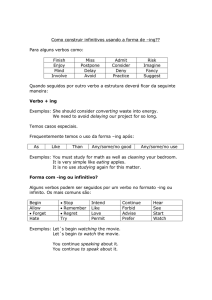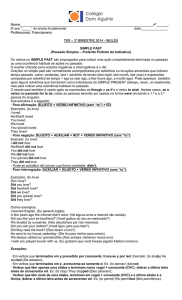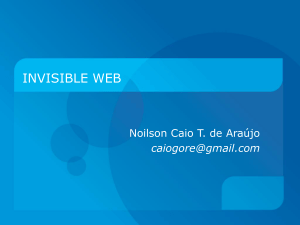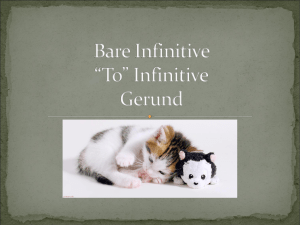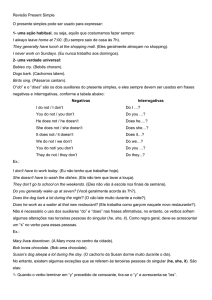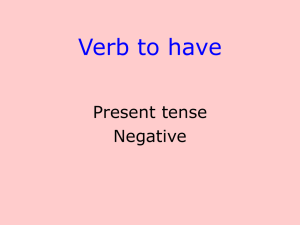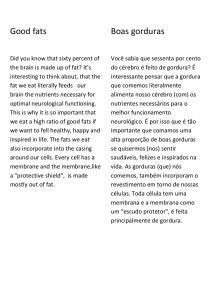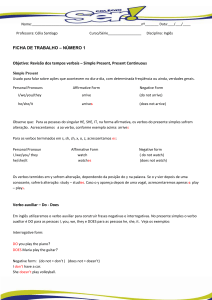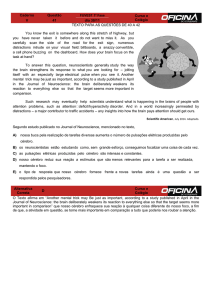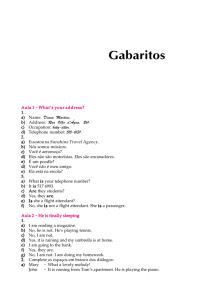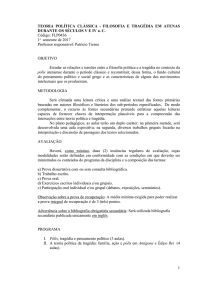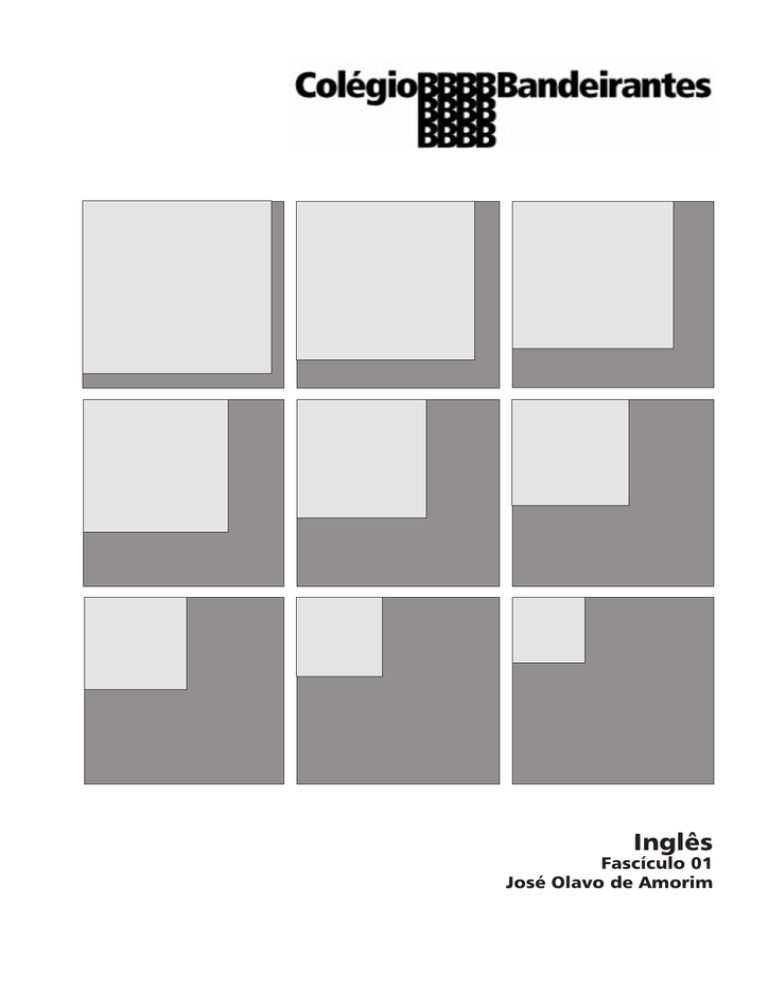
Inglês
Fascículo 01
José Olavo de Amorim
Índice
English Verb System
Resumo teórico ..................................................................................................................................1
Exercícios............................................................................................................................................5
Gabarito.............................................................................................................................................6
Prezado Aluno,
Durante 12 semanas, a partir de hoje, você terá a oportunidade de fazer sua revisão de inglês, através
da gramática, vocabulário e compreensão de textos.
Aqui estaremos trazendo um pouco de teoria e prática para que, juntas, possam lhe ajudar na sua
preparação para exames ou simplesmente como mais uma forma de contato com a língua inglesa.
The more you practice, the better.
Bom trabalho e felicidades!
Esquema das Aulas:
aula 1:
English Verb System:
• linking verbs
• auxiliary verbs / main verb
• modal verbs
aula 2:
Verb tenses:
• present: simple, progressive (continuous), perfect, perfect progressive
• past: simple, progressive (continuous), perfect
• future: simple, progressive (continuous), perfect
aula 3:
“Wh” words - how to make questions
Relative Clauses
aula 4:
Passive voice
aula 5:
if (conditional) clauses
sentences using wish, if only, as if
subjunctive
aula 6:
reported speech
aula 7:
joining words
aula 8:
word formation: prefixes & suffixes
aula 9:
vocabulary in context
false cognates
aula 10:
reading skills
aula 11:
practicing reading skills
aula 12:
practicing reading skills
English Verb System
Quando se estuda gramática, tem que se ter presente o fato de que não é apenas a forma (form)
que se deve considerar como objeto de estudo. É preciso sempre lembrar que essa forma deve ter
significado (meaning). Além da forma e significado, é preciso considerar também o uso (use).
Na 1.a aula, vamos recordar o sistema verbal da língua inglesa e como ele se comporta na formação
das sentenças, tendo sempre a idéia acima em mente.
Linking Verbs
Por “linking verbs” entende-se os verbos que, basicamente, fazem a ligação entre o sujeito da
sentença e o que se diz do sujeito.
Os verbos mais comuns são: be, seem, look, feel, appear, become, grow, sound, taste, go, get, smell,
prove.
Exemplos:
I am proud of my students’ achievements.
All the participants seemed happy.
The class activity proved to be interesting.
It is becoming darker and darker. Let’s take a cab!
His idea sounds good, doesn’t it?
This pasta tastes awful. What’s wrong with it?
After the crash of the Concorde, everybody wants to know what went wrong and what the future of
supersonic travel is.
Some people say this world is going crazy.
My ancestors were farmers.
I am getting hungry. How about going to the school cafeteria?
Contrary to parents’ expectations, the two brothers became Catholic priests.
Betty seems (to be) the ideal person to look after (take care of) the children.
A new supermarket has been built round the corner. (Passive Voice)
A: What does your brother do for a living?
B: Don’t you know? He is a physician (doctor of medicine).
Auxiliary verbs
Vão ajudar dar sentido ao verbo principal. São eles:
a.
b.
c.
d.
am, is, are, was, were
have, has
do, does, did
will
Exemplos:
A: It’s 1 p.m. I am starving. (Present Progressive or Continuous)
B: No kidding!
I don’t believe it’s raining again! It will spoil my Sunday! (Simple Future)
I have already finished reading the book for my Literature class. (Present Perfect)
1
Has your sister returned from work yet? (Present Perfect)
Nothing will prevent me from succeeding! I am determined to succeed.
Do you ever go to church on Sundays? (Simple Present)
Does your brother speak Spanish? (Simple Present)
Did you visit the Tower of London when you were there? (Simple Past)
Modal Verbs
São verbos que dão ao verbo principal, sempre na forma infinitiva, um determinado sentido ou
sinalizam uma determinada função (proibição, não necessidade, habilidade, etc...) e, assim, não são
usados de forma isolada; funcionam como auxiliares e nunca mudam a forma.
São os seguintes: can / could, may / might, ought to (= should), must, have (has) to / had to,
need, além das expressões had (‘d) better e would (‘d ) rather.
Can/ could
Can e could (além de would) podem ser usados para solicitar alguma coisa ou pedir a alguém para
fazer alguma coisa.
Exemplos:
Can I use your cell phone?
Could you close the door?
Would you mind opening the window?
Can e could (além de may – forma mais polida) podem ser usados para fazer um pedido ou pedir
permissão para fazer alguma coisa.
Exemplos:
Can I leave five minutes earlier?
Could I help with the box?
May I come in?
Quando a permissão é dada ou recusada (no tempo presente), podemos usar tanto can quanto may.
Exemplos:
You can’t use this computer now; it is out of order and will be repaired tomorrow.
You may not sit here. Choose another seat.
The students can’t take more than three books from the library at a time.
You can use any of these dictionaries.
Students can (= are allowed to) wear jeans in my school.
You can’t (= are not allowed to) park here. The sign says “No Parking.”
No tempo passado, could (= was, were allowed to) deve ser usado para falar sobre permissão ou para
reportar idéias.
Exemplos:
I couldn’t use the phone for personal calls when I worked there.
Pete said that his brother could use his car.
Can (present) e could (past) são usados para falar de habilidades que uma pessoa tem (não tem) ou
tinha (não tinha).
2
Exemplos:
When my mother was young, she could dance beautifully.
Ronald can play soccer very well.
I can’t talk to Mr. Nakamura as I don’t speak Japanese.
Sorry, I can’t understand you.
I couldn’t swim when I was a child.
Uma outra maneira de expressar habilidade é usar know how to.
Exemplo:
I don’t know how to play the piano.
My sister knows to deal with this equipment.
Must (has to, have to)
Indicam que há necessidade de se fazer alguma coisa.
Exemplos:
You’re my son. You must tell me the whole truth.
Sorry, I can’t go with you. I have to go to the dentist right now.
You must fill out the form in ink. Also, you have to sign your name in full.
Must também é usado para indicar um fato aparentemente óbvio ou uma dedução da qual temos
certeza:
Exemplo:
There are no lights on in the house. Evelyn must be out.
You must be tired. You worked hard all day long.
A: Chris told me she lived in the U.S. for three years.
B: Her English must be good.
Mustn’t indica proibição:
Exemplo:
Students mustn’t enter the classroom after 7 o’clock.
Should / Ought to
Should é usado para dizer que é aconselhável (ou não) fazer alguma coisa.
Exemplos:
‘X-Men’ is a great movie. You should see it.
I shouldn’t live under so much pressure. I know it is not good for my health.
Cars in Brazil cost a lot of money. They ought to cost less.
You shouldn’t leave your baggage unattended. Keep an eye on it.
Had better tem sentido mais enfático que should, sugerindo que, se algo não for feito, poderá haver
alguma consequência.
Exemplos:
A: I don’t feel OK today.
B: You’d better go home.
This is my first school day. I’d better not be late.
3
May / might
Expressam probabilidade.
Exemplo:
A paragraph may be as short as a single word or as long as many pages.
You might be surprised when you hear the news today.
Would rather
É uma expressão que dá o sentido de preferência.
Exemplos:
A: What did Monica tell you yesterday?
B: I’d rather not say.
It’s getting too smoky here. I’d rather leave the room. Let’s talk some place else.
Should have + past participle alguém lamenta não ter feito alguma coisa ou feito alguma coisa
errada
Exemplo:
‘The Beach’ is not on any more. You should have seen it.
I shouldn’t have said that. It was very rude of me.
Must have + past participle dedução lógica de que algo aconteceu no passado.
Exemplo:
Your grade is 10. You must have studied a lot for this test.
Could have + past participle alguma coisa foi possível, mas não aconteceu.
Exemplos:
When I was in Lisbon, I could have stayed at the Hilton, but I decided to save some money and chose
a cheaper hotel.
Davidson could have been selected for this position if he had been applied for as he is highly qualified.
4
Exercícios
01. Newsweek, August 7, 2000 – page 54
Science
If You __________ Take the Heat...
Record temperatures and droughts _________ be here to stay
a. Shouldn’t / can
b. Can’t / may
c. Mustn’t / should
d. Don’t have to / ought to
e. Aren’t able to / will
02. Time – July 10, 2000 – page 17
Even if your business grows to Olympian proportions, __________________ your export delivery
company be equipped to handle it?
a. can’t
b. mustn’t
c. ought not
d. may not
e. shouldn’t
03. Nonstandard English ________________ mean wrong language. It means language that is not
appropriate in situations where standard English _______ expected.
a. doesn’t / is
b. can’t / has
c. don’t / was
d. shouldn’t / had
e. won’t / can
04. I wish I ________ lost the money. I’m in real trouble now.
a. didn’t
b. won’t
c. hadn’t
d. can’t
e. wouldn’t
05. “Don’t give up. Try again. I’m sure you can do it,” said the counselor.
The part in bold expresses the idea of
a. probability
b. advice
c. necessity
d. ability
e. permission
5
06. Analise as sentenças abaixo e assinale a alternativa que apresenta, respectivamente, a idéia expressa
pelo verbo modal usado.
The new secretary can type sixty-five words a minute. Isn’t it amazing?
One mustn’t smoke in public places - shopping malls, for example.
“You should exercise as often as possible,” said the cardiologist.
Could you turn down the radio for a moment?
a. ability, prohibition, advice, polite request
b. permission, no necessity, recommendation, ability
c. permission, recommendation, obligation, permission
d. probability, obligation, suggestion, probability
e. ability, necessity, probability, request
Gabarito
01. Answer b
O título (incompleto) coloca o seguinte problema: se você acha impossível aguentar o calor (hoje em
dia) - daí o uso de can’t - imagina o que vem por aí. No subtítulo, há uma afirmação de que há uma
probabilidade de que secas e temperaturas altas tornem-se permanentes, daí o uso de may.
02. Answer e
A pergunta colocada é a de que se você não deveria equipar melhor o serviço de entrega de sua
empresa para fazer frente ao crescimento em proporções olímpicas, isto é, gigantescas de seus
negócios. Daí o uso de shouldn’t.
03. Answer a
O verbo auxiliar para Simple Present, na 3.a pessoa do singular, é does. Na voz passiva, be é o verbo
auxiliar (a forma vai variar de acordo com o tempo verbal: am, is, are, was, were, has been, have been,
had been, will be, is being, was being, must be, etc...)
Lembrete: os auxiliares do, does (present), did (past) são seguidos da base form do verbo (ou infinitivo
sem ‘to’).
Exemplos:
My sister doesn’t know her way in town.
Richard did not send e-mail messages to anyone yesterday.
Na voz passiva, o auxiliar é seguido do past participle do verbo.
Exemplos:
‘Hamlet’ was written by William Shakespeare.
The text will be translated from Portuguese into English tomorrow.
6
04. Answer c
Os auxiliares has, have, had são seguidos do particípio passado do verbo.
Exemplos:
I have done it.
Mike hasn’t eaten lunch yet.
Kathy had left before I arrived.
Os auxiliares did (didn’t), will (won’t), can (can’t), would (wouldn’t) são seguidos da base form of the
verb: I didn’t see it.
05. Answer d
probability → may
advice, recommendation → should, ought to
necessity → has to, have to, had to
permission → may (formal), can (informal)
06. Answer a
Can also expresses permission. Exemplo: Can I use your phone for a moment?
Must expresses obligation; mustn’t expresses prohibition. No necessity is expressed by don’t (doesn’t)
have to.
Exemplos:
A: Must I wear the school uniform every day?
B: No, you don’t have to.
7

